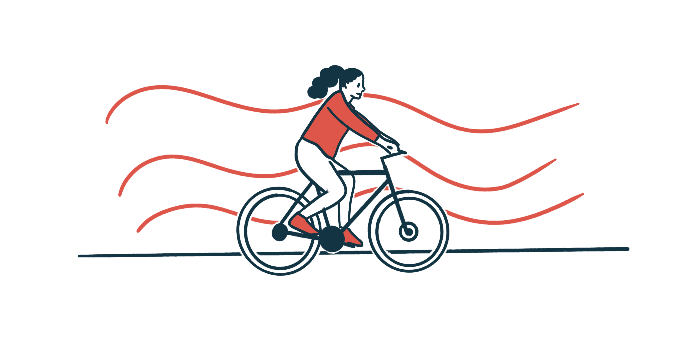Cycling better than electrical muscle stimulation for cognition: Study
Exercise reinforces brain-muscle connection, researchers say
Written by |

Cycling was more effective than electrical muscle stimulation at improving cognitive function, according to a small study. The results have implications for neurodegenerative diseases like Parkinson’s in which both movement and cognition can be affected.
“Our results suggest that the relationship between exercise and brain activity is crucial for faster reaction time,” study co-author Joe Costello, PhD, associate head of research and innovation at the University of Portsmouth School of Psychology, Sport and Health Sciences, said in a university news story. “Forcing the muscles to move using an electrical current takes away this connection, and as a result participants didn’t experience an increase in cognitive performance like they did while cycling.”
Understanding how voluntary muscle movement during moderate-intensity exercise benefits the brain by shortening reaction time could lead to new approaches for those who can’t exercise due to physical limitations. Reaction time is a measure of how quickly someone responds to a specific stimulus, such as a sound, visual cue, or touch, and is often used to assess cognition.
The study, “Effects of voluntary exercise and electrical muscle stimulation on reaction time in the Go/No-Go task,” was published in the European Journal of Applied Physiology.
Electrical muscle stimulation causes muscles to contract by sending electrical impulses that mimic the signals sent out naturally by the nervous system to make the body move. However, it’s been unclear whether electrical muscle stimulation can improve cognitive function in the same way that regular exercise does.
Moderate-intensity exercise gives biggest benefit
The researchers asked 24 healthy young men to complete a cognitive test called the Go/No-Go task, which measures how quickly and accurately someone responds to certain signals, before and after three different forms of exercise: electrical muscle stimulation applied to their leg muscles, low-intensity cycling, and moderate-intensity cycling.
Reaction time improved significantly after moderate-intensity exercise but not after electrical muscle stimulation or low-intensity exercise. This suggests that moderate-intensity exercise was better at improving cognitive function.
“Not everyone is able to reap the benefits of physical activity — like faster reaction times — because of injury or disability,” Costello said. “If we figure out exactly what it is that causes cardiovascular exercise to improve cognitive performance then we can potentially replicate this and remove the need to do moderate-intensity exercise.”
The researchers also looked at heart rates using a measure that reflects how the body’s parasympathetic nervous system influences how fast the heart beats. The parasympathetic nervous system controls involuntary actions such as breathing, heart rate, and digestion.
“In general, decreased parasympathetic nervous system activity is accompanied by increased sympathetic nervous system activity during exercise,” the researchers wrote, noting that understanding this relationship could provide insights into the benefits of moderate-intensity exercise.
Shorter reaction time during moderate-intensity exercise was closely linked to increases in heart rate. The sympathetic nervous system is more active during moderate-intensity exercise, which could explain why this level of exercise led to better cognitive function.
The sympathetic nervous system “is best known for its role in responding to dangerous or stressful situations, where it activates to speed up your heart rate and deliver more blood to areas of your body to help you get out of danger,” said study leader Soichi Ando, PhD, associate professor at the University of Electro-Communications in Japan.
The findings, Ando said, suggest that “standard central neural activity — which happens during low-intensity and forced movement — isn’t enough to cause improved reaction.” Instead, he said, ” it may be — at least in part — the result of enhanced sympathetic nervous system activity, which happens during moderate-intensity exercise.”






